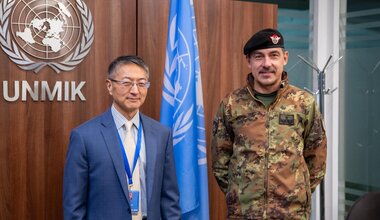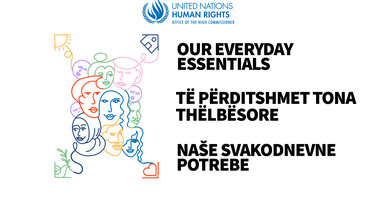The Special Representative of the UN Secretary-General (SRSG) and Head of UNMIK Lamberto Zannier, announced today Thursday 30 June that he will be taking up the post of Secretary-General of the Organization for Security and Co-Operation in Europe (OSCE) and leave Kosovo.
Ophelia FM speaks with SRSG Lamberto Zannier on his recent appointment as Secretary General of the OSCE and on his last three years as the Head of UNMIK.
Ophelia FM transmits its programs 24/7 in Serbian, Albanian and English and can be heard in every major city in Kosovo. Pristina 107.2, Mitrovica 106.5.
This interview is available for the media. (download)
Transcript of Interview with SRSG, 30 June 2011
Ophelia FM: You’ve seen the mission change over time, over these three years. What would you say that UNMIK’s major contribution has been to Kosovo and the region?
SRSG:
First of all thank you for your congratulations . It is a pleasure for me at this moment when I’m about to leave my job to have an opportunity to look back at what we’ve gone through in this period. It has been 3 years that went by very fast, very eventful, and not easy in terms of adjustments required by the international community in its own operations concerning Kosovo and certainly this was very much an issue for UNMIK.
First of all let me point out that what you see today in Kosovo is largely a result of a very large operation and very large investment by the UN. The UN spent a lot of money, and they brought resources, they brought people and many of the things you see here represent the accomplishment of the work of thse people and the investments of the UN in terms of material and financial resources. In that way Kosovo is very much a UN creation. And that is one of the starting points of this reflection.
Now in the last three years we had to adapt because at some point the political processes have taken their own dynamics and the role of the international community, certainly the role of UNMIK became much more political in responding to these events, in adjusting to these events and also in helping to find bridges and solutions to problems that are very divisive within the international community. The Security Council was divided on the issue of the declaration of the independence of Kosovo and it is still divided today. In fact in the Council today there is still a majority of states that do not recognize Kosovo. And this for Kosovo is obviously a problem not only a problem in terms of its membership in the UN or in other international organizations but also a problem in the interaction between Kosovo and a large part of the international community.
So back to UNMIK, what we’ve done is we’ve gone through a reconfiguration process. When I started UNMIK had the strength of 5000 people. We’ve reduced it to a much smaller operation. We still have an administration element in the North which is an interim administration of course and will remain there until better ways are found to address the north Mitrovica issue. In the other municipalities we only have a representative without direct administration roles.
So this reconfiguration has in a way opened up what is the new path for Kosovo which is the European path, it’s the European perspective for the region. I think that over time this is the best direction for Kosovo. The freedom of movement issue, the issue of visa liberalization are very much on the table and we’ll have to deal with that. Part of the burden is on the Kosovo side, legislation needs to be passed but also several steps need to be made also on the European side, there has to be recognition of the steps taken by Kosovo. I personal think that freedom of movement should be looked at in terms of as the right of individuals to move. And as this applies increasingly to people in the region, at some point it will have to apply to Kosovo as well. So the European perspective is good, our reconfiguration helped bring in EULEX and I think that is a step forward for Kosovo.
You’ve talked about some of the changes that have happened over your time here in Kosovo, over the three years. What would you have liked to see happen during your tenure here?
What I would have liked to see happen would have been more progress in reconciliation. It is one of the areas where still not enough progress is taking place. We know that is a post-conflict situation this is always very difficult. But we need to make an effort to bring the communities together. When you talk about the issues of the North still being open, a starting point of this is exactly that: reconciliation. The return of those displaced people who should be able to find in a real, concrete and reassuring process of reconciliation the kind of encouragement needed to go back to their original places and to reestablish a truly functioning multiethnic society. I personally think that that is really the challenge for Kosovo. Yes, there have been movements but the number of returns is still relatively limited. There has been progress with the elections and with the participation of the minority communities in the Kosovo elections but there is still a lingering problem of parallelism in the administration which yes is a political problem and a consequence of the political problems that still exist but also in a way it can be linked to the fact that within the communities there is still not that degree of confidence to sit down and work together.
Now that was specific to the North of Kosovo how would you describe the rest of Kosovo?
The North requires first of all an engagement with the communities there. We’ve seen the announcement of the Kosovo strategy for the North and the Secretary General has commented himself in his report to the Security Council, but basically this is a Kosovo issue. While not commenting on the substance, I think from a UN perspective what we are saying is that progress is good because the issue needs to be solved but it is important that progress take place in a context of stability and in a context of continuing security for all people. So that remains also at the core of our mandate to ensure that there is no destabilization.
The dynamics in the North, from what I can see, are different from the rest of Kosovo. In the rest there is more engagement from minorities with institutions. I think it is good that processes that took place were processes that do protect minority groups and that will be an element of reassurance which is required to promote more rapid reconciliation.
After a conflict that was as difficult as the one that took place in this area 12 years ago, you do understand that time is needed for people to get over the trauma of those difficult times. And I certainly understand. And I’m very close to people who suffered from that conflict and the consequences of it during that time. And certainly there is work to be done in many areas- there is still too many missing persons cases open. I think it is important that we come to a closure in a positive manner.
Now the approach that is needed is a forward looking one, yes it is important to work on the issues that are still lingering but it is important to do it in a mode that is a forward looking one, having a good idea of where you want to be, where you want to go, what your perspectives and expectations are and work towards them.
Since 2008, considerable competencies have been transferred to EULEX or to Kosovo authorities this has lead many in Kosovo to question the presence of UNMIK. Would you care to respond?
First of all I need to explain. There was no technical transfer of anything. UNMIK phased out certain functions as a result of developments on the ground and EULEX took over certain functions in a different mode. The Europeans chose to interpret their function in the rule of law differently that the UN. The role that the Kosovar institutions took over is something we have witnessed from our side but it is not the result of an active transfer. Having said that, these developments especially the competences taken over by the Kosovar institutions created the need for UNMIK to facilitate interaction of these institutions with the external world. This changed the mode of operation of UNMIK. We are now less engaged in performing certain functions but more engaged in facilitating the performance of those functions vis-a-vis either international organizations or vis-a-vis no recognizing countries. This applies to a very broad range of issues whether regional cooperation issues like CEFTA where we have to be present as the original signatories of the treaty, or the energy community or larger issues. We still have an Interpol office because Interpol wants us as an interphase for its cooperation with Kosovo . The same applies to judicial affairs, legal issues and a number of other issues. We are still putting UN stamps on university certificates so that students can go abroad and have their certificates recognized by countries who might have a problem with diplomas that originate from Kosovar institutions.
It sounds like you, or UNMIK works in close contact with the other institutions here. Is there a high level of Cooperation?
There’s always been a high level of cooperation here between UNMIK and other international institutions here, this also has evolved over time in regards to the nature of the functions. Certainly with Europeans and EULEX, there has been a very close interactions both in terms of assessments and operational activities. With KFOR the interactions continued closely but not as closely as when UNMIK was in control of the police because operationally the nature of the relationship was not the same. Having said that, I found it extremely important for me not only to continue cooperation that has always been very positive, easy and productive with the commander of KFOR, EULEX and the Europeans, UNESCO on cultural issues, and the rest of the UN agencies with whom we are now developing a more integrated strategy for the UN in Kosovo but also to engage with these organizations at headquarters levels. I often traveled to Brussels to talk to the various European institutions to explain some of the issues from our own perspective, to make sure that there planning could take into account these perspectives. The same I did with NATO and others.
Recently, the EU mission announced it will set up a special team to investigate the allegations contained in Dick Marty's report. What will be UNMIK's role in these investigations?
Strictly speaking UNMIK will not have a role in the investigations. But certainly the allegations contained in the report which is something that UNMIK is familiar with because they have appeared in the past in the the organization and in the work of the ICTY. They are serious allegations and it remains our view that in the interest of everyone it is important to move forward with these investigations. The investigations should be conducted in a way that makes them authoritative and credible and they should proceed in a context where there is full international cooperation.
There are discussions in New York on how to proceed and how to set- up the structure to deal with the investigations. This is really not an UNMIK issue. The Europeans are arguing that EULEX has the capacity to carry them out, others are less convinced and would like an ad hoc mechanism. From our perspective, whatever decision is fine as long there is a quick movement on the investigation and that the investigation is conducted in a proper way and produces results in a credible manner. I would expect the last session of the Security Council in August to discuss this issue once again. I hope that it will be a conclusive discussion and that afterwards work can develop on this is. I understand that EULEX is getting ready to do it, my hope is that EULEX can do it in consultations with everybody and in conditions of transparency which should lead to a broader understanding on the way forward.
Now moving from your past to your future... Do you intend, as you have announced, to accept the offer to become the new Secretary-General of the OSCE? As the head of the OSCE, what do you plan to bring to the organization? What do you see as the major challenges facing the OSCE?
Let me say on this I’ve been appointed only 5 hours ago so it is a bit early to set out an agenda. I will travel to Vienna tomorrow morning (July 1) to start working with the OSCE at the earliest possible opportunity. It will be my first working day in Vienna. Seen from a distance, it seems to me that one of the important issues at the OSCE is to take a good look at the agenda, try to streamline it and to have a better sense of what are the strategic objectives for the organization. I think that we are coming from a summit that already gave a clear indication of the path that should be followed, that has put a number of things on the agenda of the organization. It will be important to make sure that concrete steps are taken to operationalize these guidelines. In a way to regroup around these central new tasks and move forward while keeping an eye on the need to give more profile to the organization and the need to show the added value that OSCE brings. As an organization it has a number of important elements, consensus-based decision making, a transatlantic link, a central Asian dimension, a partnership with a number of countries including in the Mediterranean where there have been a number of recent develops which are relevant to Europe. So the agenda is certainly a broad one but the organization is a good one. I think that one of the strength of this organization is the fact that it is consensus based decision making, which can as we’ve seen with the appointment of the Secretary General be complicated, but once it achieves a result, it is a result that is endorsed by all of its members even the smaller member states. And I think that’s good because it projects a sense of ownership on the organizations and on each of the participating states.
Given your experience in Kosovo and familiarity with the OSCE mission here what role can you continue to play in Kosovo from OSCE headquarters in Vienna, Austria?
Given my professional experience here over the last few years, you bet that I will keep an eye on the Kosovo issue very closely from Vienna. It would be surprising if I didn’t. In fact, I already have an idea of coming back to Kosovo soon in order to visit the mission, which is the largest field operation of the OSCE.
I think that the OSCE mission in Kosovo is doing a very good job. It is focusing on some very important issues, many in the light of what we were talking about earlier in terms of facilitating reconciliation and contacts between the communities. It will have, like everyone else in Kosovo, to keep evolving and adjusting. This will have to take place, as with everything in the OSCE, in full consultation with all interested parties in the organization and on the basis of consensus in the organization. So, certainly, I can’t prejudge how this will happen because it will have to go through a process of this nature. But it seems to me that there is still an opportunity for the OSCE in Kosovo to continue providing a good contribution to the development of Kosovo and relations between the communities. In regards to its mandate it is very large, such this as building democratic institutions, monitoring the respect of human rights and that’s a good agenda and an agenda from a personal perspective that I will support.

 UN
UN United Nations Peacekeeping
United Nations Peacekeeping





